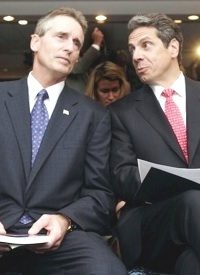
Andrew Cuomo, in announcing his candidacy for Governor of New York, has attacked: “The influence of lobbyists and their special interests.” His solution is to pass state campaign finance laws which create new contribution limits. As he delivered this pronouncement, however, Cuomo sat on an estimated $7.1 million that he had received from political action committees, real estate and construction firms, big unions, and health care lobbying firms.
In 2007, Cuomo promised New Yorkers that he would not take any contributions of over $10,000. He has broken that pledge, which makes Cuomo’s attack on Albany insiders seem phony and hollow. When he ran for office in 2002 and then again in 2006, before his 2007 pledge, Cuomo received heavy support from the very special interests that he now promises to fight.
When Cuomo, running for Governor of New York this election cycle, filed for the office, he had about $16 million of campaign funds on hand — yet he maintains that he cannot be bought. It is interesting, then, why special interests have been so eager to give him money. The records shows that big labor has given Cuomo $1.4 million; real estate and construction interests have given him $1.3 million; health care interests have given handsomely as well.
As Attorney General of New York, Andrew Cuomo opened investigations of the Medical Society of New York, as well as the New Year State United Teachers and the Civil Service Employees Association (both public employees unions). He pushed for laws supported by the real estate industry. His political office has been inextricably linked with special interests in New York State.
This does not mean Cuomo himself is particularly tainted or dishonest. What it does mean, however, is that when government becomes the regulator of huge chunks of private economic activity and when state laws and regulations become as important to private interests and economic efficiency in the marketplace, then businesses will, quite naturally, “invest” in politicians. Nothing that Mr. Cuomo proposes or can propose will possibly change that.
In the early days of the American Republic, huge political war chests and slush funds were unknown. Putting money into government was a very bad investment because government was small and it stayed out of the lives of its citizens and their business almost completely. So-called “progressives” like Cuomo seem to talk as if good intentions and a pure heart can somehow protect against the crippling seduction of big government.
Not only is that assumption false, but the corruption of government that comes from intrusion into every aspect of private life means that the very laws to limit campaign contributions, etc., will be written and enforced by politicians who have used huge piles of money from the special interests they profess to regulate. Small government, the way the Founding Fathers intended, is the best cure from corruption in government. The axiom “Power corrupts. Absolute power corrupts absolutely” is a truth that defies noble platitudes.
Photo: Andrew Cuomo, right, Democratic candidate for governor of New York, talks with Rochester, N.Y., Mayor Robert Duffy, his choice for running mate, in New York on May 26, 2010.: AP Images



